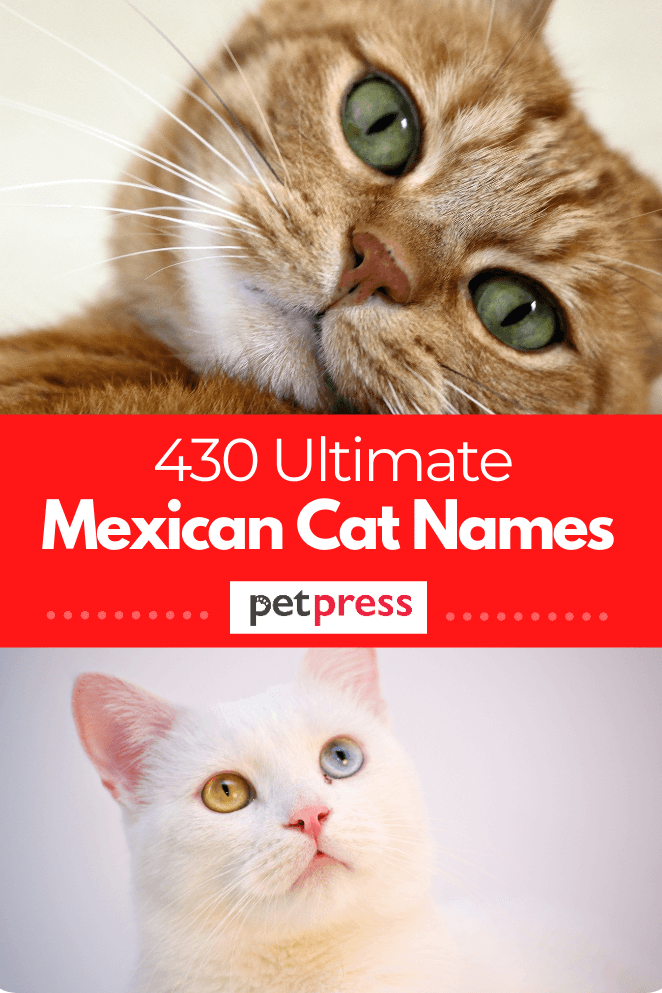
Mexico is rich in culture and history, it’s known with its historical tribes like the Aztecs or Mayan, and Zapotec.
But, modern Mexico is influenced by Spain including language and names. So, Mexican names would be similar to Spanish names.
But, we’ve compiled the best Mexican cat names to inspire you to find the perfect name for your cute little kitten.
Male Mexican Cat Names
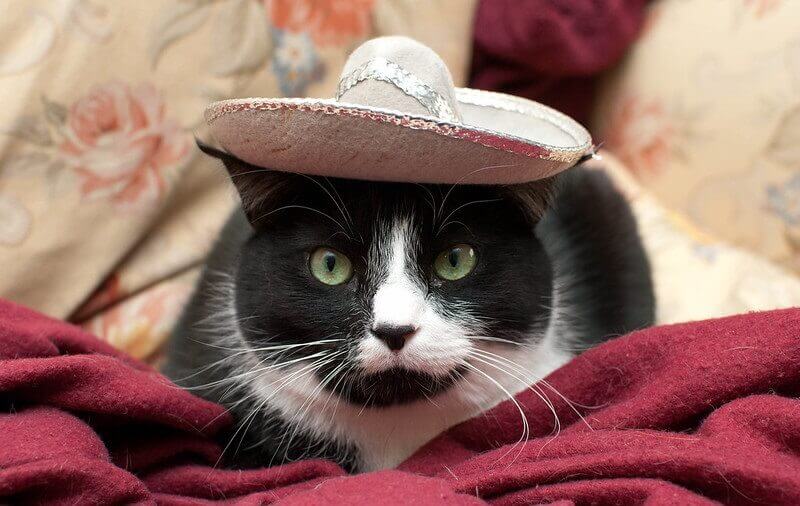
| Name | Meaning |
| Mauricio |
Derived from Latin, meaning “dark-skinned” or “Moorish,” symbolizing strength and resilience
|
| Lión |
Spanish for “lion,” symbolizing courage and strength
|
| Cruz |
Meaning “cross,” symbolizing faith and spirituality
|
| Silvi |
Derived from Latin, meaning “from the woods,” symbolizing connection to nature
|
| Leonor |
Derived from Greek, meaning “bright” or “shining,” symbolizing intelligence and vitality
|
| Cazador |
Spanish for “hunter,” symbolizing agility and instinct
|
| Fuerte |
Spanish for “strong,” symbolizing power and resilience
|
| Sergio |
Derived from Latin, meaning “servant” or “attendant,” symbolizing loyalty and dedication
|
| Fernando |
Derived from Germanic, meaning “bold voyager,” symbolizing courage and adventure
|
| Dario |
Derived from Greek, meaning “upholder of the good,” symbolizing righteousness and integrity
|
| Abejundio |
Spanish for “beekeeper,” symbolizing industriousness and diligence
|
| Miguel |
Derived from Hebrew, meaning “who is like God,” symbolizing divine protection
|
| Ponce |
Derived from Latin, meaning “fifth” or “five,” symbolizing balance and harmony
|
| Carlos |
Derived from Germanic, meaning “man” or “warrior,” symbolizing strength and leadership
|
| Allegro |
Italian for “cheerful” or “lively,” symbolizing joy and vitality
|
| Bigotes |
Spanish for “whiskers,” symbolizing elegance and sophistication
|
| Francisco |
Derived from Spanish, meaning “Frenchman” or “free man,” symbolizing independence and freedom
|
| Santo |
Spanish for “saint,” symbolizing purity and holiness
|
| Pablo |
Derived from Latin, meaning “small” or “humble,” symbolizing humility and modesty
|
| Corto |
Spanish for “short,” symbolizing efficiency and practicality
|
| Tigre |
Spanish for “tiger,” symbolizing strength and ferocity
|
| Rafael |
Derived from Hebrew, meaning “God has healed,” symbolizing divine protection and healing
|
| Sancho |
Spanish for “holy” or “sacred,” symbolizing spirituality and reverence
|
| Gato |
Spanish for “male cat,” symbolizing agility and grace
|
| Jose |
Derived from Hebrew, meaning “God will add,” symbolizing divine blessing
|
| Esteban |
Derived from Greek, meaning “crown” or “wreath,” symbolizing victory and honor
|
| Ximen |
Derived from Basque, meaning “hearkening” or “obedient,” symbolizing loyalty and obedience
|
| Marques |
Spanish for “marquis,” symbolizing nobility and distinction
|
| Chico |
Spanish for “boy,” symbolizing youthfulness and playfulness
|
| Joven |
Spanish for “young,” symbolizing vitality and energy
|
| Caliente |
Spanish for “hot,” symbolizing passion and intensity
|
| Thiago |
Variant of Santiago, meaning “supplanter” or “substitute,” symbolizing adaptability and resilience
|
| Felipe |
Derived from Greek, meaning “lover of horses,” symbolizing strength and freedom
|
| Domingo |
Spanish for “Sunday,” symbolizing rest and rejuvenation
|
| Valiente |
Spanish for “brave,” symbolizing courage and fearlessness
|
| Segundo |
Spanish for “second,” symbolizing perseverance and determination
|
| Raúl |
Derived from Germanic, meaning “wise wolf,” symbolizing intelligence and wisdom
|
| Carlito |
Spanish diminutive of Carlos, symbolizing affection and familiarity
|
| Mario |
Derived from Latin, meaning “manly” or “warrior,” symbolizing strength and courage
|
| Vivo |
Spanish for “alive” or “lively,” symbolizing vitality and energy
|
| Donato |
Derived from Latin, meaning “given” or “granted,” symbolizing generosity and kindness
|
| Gerardo |
Derived from Germanic, meaning “spear” or “brave with a spear,” symbolizing courage and strength
|
| Lisandro |
Derived from Greek, meaning “liberator” or “deliverer,” symbolizing freedom and liberation
|
| Andrés |
Derived from Greek, meaning “manly” or “brave,” symbolizing courage and resilience
|
| Zorro |
Spanish for “fox,” symbolizing cunning and agility
|
| Manuel |
Derived from Hebrew, meaning “God is with us,” symbolizing divine protection and guidance
|
| Gabriel |
Derived from Hebrew, meaning “God is my strength,” symbolizing divine protection and power
|
| Marco |
Derived from Latin, meaning “warlike” or “martial,” symbolizing strength and valor
|
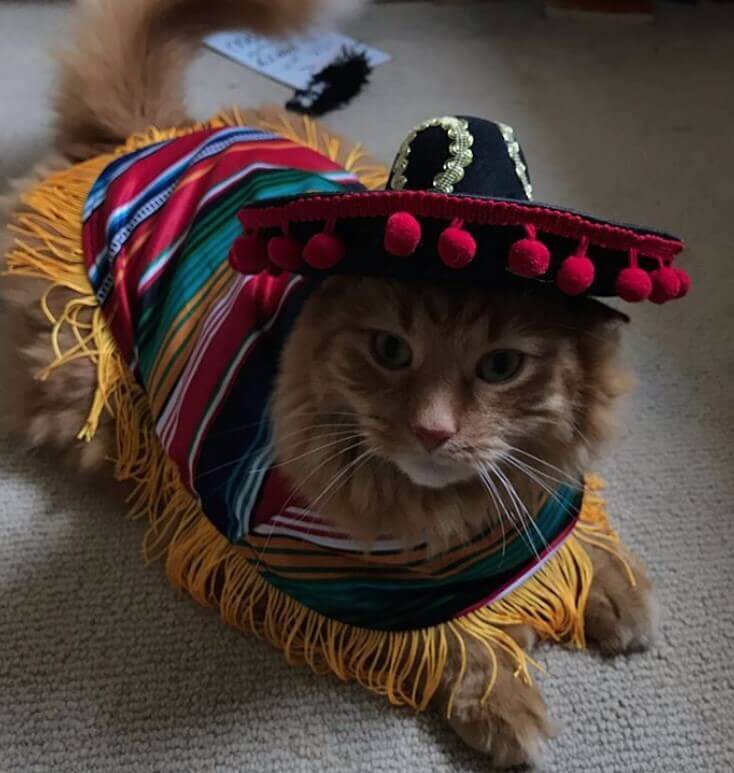
| Leon |
Spanish for “lion,” symbolizing courage and strength
|
| Esponjoso |
Spanish for “fluffy,” symbolizing softness and comfort
|
| Julio |
Derived from Latin, meaning “youthful” or “downy-bearded,” symbolizing vitality and energy
|
| Emilio |
Derived from Latin, meaning “rival” or “emulating,” symbolizing competitiveness and determination
|
| Luis |
Derived from Germanic, meaning “famous warrior,” symbolizing strength and leadership
|
| Pequeño |
Spanish for “small,” symbolizing innocence and charm
|
| Vicente |
Derived from Latin, meaning “victorious” or “conquering,” symbolizing triumph and success
|
| Eloy |
Derived from Latin, meaning “chosen one” or “holy,” symbolizing divine protection
|
| Tiburon |
Spanish for “shark,” symbolizing fierceness and tenacity
|
| Bautista |
Spanish for “baptist,” symbolizing purity and righteousness
|
| Lobo |
Spanish for “wolf,” symbolizing independence and strength
|
| Julián |
Derived from Latin, meaning “youthful” or “downy-bearded,” symbolizing vigor and vitality
|
| Ignacio |
Derived from Latin, meaning “ardent” or “fiery,” symbolizing passion and intensity
|
| Luz |
Spanish for “light,” symbolizing enlightenment and clarity
|
| Ferdinand |
Derived from Germanic, meaning “brave traveler,” symbolizing courage and adventure
|
| Geraldo |
Derived from Germanic, meaning “spear ruler,” symbolizing strength and authority
|
| Navarro |
Derived from Basque, meaning “the new home,” symbolizing new beginnings and exploration
|
| Eduardo |
Derived from Germanic, meaning “wealthy guardian,” symbolizing protection and prosperity
|
| Dulce |
Spanish for “sweet,” symbolizing affection and tenderness
|
| Cielo |
Spanish for “sky” or “heaven,” symbolizing spirituality and transcendence
|
| Alonso |
Derived from Germanic, meaning “noble and ready,” symbolizing nobility and readiness
|
| Alejandro |
Derived from Greek, meaning “defender of the people,” symbolizing protection and loyalty
|
| Armand |
Derived from Germanic, meaning “soldier,” symbolizing strength and bravery
|
| Vito |
Derived from Latin, meaning “life,” symbolizing vitality and energy
|
| Roberto |
Derived from Germanic, meaning “bright fame,” symbolizing renown and glory
|
| Guido |
Derived from Germanic, meaning “guide,” symbolizing leadership and guidance
|
| Gitano |
Spanish for “gypsy,” symbolizing freedom and wanderlust
|
| Galeno |
Derived from Greek, meaning “serene” or “calm,” symbolizing tranquility and peace
|
| Sierra |
Spanish for “mountains,” symbolizing strength and endurance
|
| Antonio |
Derived from Latin, meaning “priceless” or “praiseworthy,” symbolizing value and honor
|
| Sombra |
Spanish for “shadow,” symbolizing mystery and intrigue
|
| Seguro |
Spanish for “safe,” symbolizing security and protection
|
| Armando |
Derived from Germanic, meaning “army man,” symbolizing courage and strength
|
| Ángel |
Spanish for “angel,” symbolizing divine protection and guidance
|
| Socorro |
Spanish for “help” or “aid,” symbolizing assistance and support
|
| Paulo |
Derived from Latin, meaning “small” or “humble,” symbolizing humility and modesty
|
| Rodrigo |
Derived from Germanic, meaning “famous ruler,” symbolizing leadership and authority
|
| Roldan |
Derived from Germanic, meaning “renowned in the land,” symbolizing fame and recognition
|
| Ronroneo |
Spanish for “purr,” symbolizing contentment and comfort
|
| Tequila |
Derived from Nahuatl, meaning “place of tribute,” symbolizing celebration and festivity
|
| Lorenzo |
Derived from Latin, meaning “laurel-crowned,” symbolizing victory and honor
|
| Lupe |
Spanish diminutive of Guadalupe, symbolizing grace and beauty
|
| Nicolas |
Derived from Greek, meaning “victory of the people,” symbolizing triumph and success
|
| Ricardo |
Derived from Germanic, meaning “powerful ruler,” symbolizing authority and strength
|
| Niño |
Spanish for “little boy,” symbolizing innocence and playfulness
|
| Rico |
Spanish for “rich” or “wealthy,” symbolizing abundance and prosperity
|
| Onofre |
Derived from Greek, meaning “bringer of profit,” symbolizing success and prosperity
|
| Salvador |
Spanish for “savior,” symbolizing rescue and salvation
|
| Loco |
Spanish for “crazy” or “mad,” symbolizing eccentricity and spontaneity
|
| Orlando |
Derived from Germanic, meaning “famous throughout the land,” symbolizing renown and fame
|
| Diego |
Derived from Greek, meaning “supplanter” or “substitute,” symbolizing adaptability and resilience
|

| Arturo |
Derived from Celtic, meaning “bear-man,” symbolizing strength and courage
|
| Juan |
Spanish equivalent of John, meaning “God is gracious,” symbolizing divine favor and blessing
|
| Serge |
Short form of Sergio, derived from Latin, meaning “servant” or “attendant,” symbolizing loyalty and dedication
|
| Oso |
Spanish for “bear,” symbolizing strength and protection
|
| Reyes |
Spanish for “kings,” symbolizing royalty and nobility
|
| Santino |
Italian diminutive of Santo, meaning “little saint,” symbolizing purity and holiness
|
| Enrique |
Derived from Germanic, meaning “ruler of the estate,” symbolizing leadership and authority
|
| Benito |
Derived from Latin, meaning “blessed,” symbolizing divine favor and protection
|
| Carmine |
Derived from Latin, meaning “crimson” or “red,” symbolizing passion and vitality
|
| Feroz |
Spanish for “fierce,” symbolizing strength and ferocity
|
| Iván |
Derived from Slavic, meaning “God is gracious,” symbolizing divine favor and blessing
|
| Gonzalo |
Derived from Germanic, meaning “battle” or “war,” symbolizing strength and courage
|
| Consuelo |
Spanish for “consolation” or “comfort,” symbolizing solace and reassurance
|
| Feliz |
Spanish for “happy” or “fortunate,” symbolizing joy and contentment
|
| Santiago |
Spanish for “Saint James,” symbolizing divine protection and guidance
|
| Oro |
Spanish for “gold,” symbolizing wealth and prosperity
|
| Iñigo |
Derived from Latin, meaning “fiery,” symbolizing passion and intensity
|
| Pedro |
Derived from Latin, meaning “rock” or “stone,” symbolizing strength and stability
|
| Federico |
Derived from Germanic, meaning “peaceful ruler,” symbolizing harmony and leadership
|
| Paco |
Spanish diminutive of Francisco, symbolizing familiarity and affection
|
| Bernardo |
Derived from Germanic, meaning “brave as a bear,” symbolizing courage and strength
|
| Javier |
Derived from Basque, meaning “new house” or “castle,” symbolizing renewal and protection
|
| Quito |
Spanish diminutive of Enrique, symbolizing familiarity and affection
|
| Valentino |
Derived from Latin, meaning “strong” or “healthy,” symbolizing vitality and vigor
|
| Raymundo |
Derived from Germanic, meaning “wise protector,” symbolizing wisdom and guidance
|
| Cortez |
Derived from Latin, meaning “courteous” or “polite,” symbolizing manners and refinement
|
| Jesús |
Spanish for “Jesus,” symbolizing divine love and salvation
|
| Hermoso |
Spanish for “handsome” or “beautiful,” symbolizing attractiveness and elegance
|
| Matías |
Derived from Hebrew, meaning “gift of God,” symbolizing divine blessing
|
| Cerveza |
Spanish for “beer,” symbolizing relaxation and enjoyment
|
| Sanche |
Variant of Sancho, meaning “saint,” symbolizing spirituality and holiness
|
| Ramiro |
Derived from Germanic, meaning “famous counsel,” symbolizing wisdom and renown
|
| Tipo |
Spanish for “kind” or “type,” symbolizing gentleness and compassion
|
| Peludo |
Spanish for “furry” or “hairy,” symbolizing coziness and warmth
|
| Bueno |
Spanish for “good,” symbolizing kindness and generosity
|
| Suave |
Spanish for “soft” or “smooth,” symbolizing gentleness and elegance
|
| Raúl |
Derived from Germanic, meaning “wise wolf,” symbolizing intelligence and wisdom
|
| Nacho |
Spanish diminutive of Ignacio, symbolizing familiarity and affection
|
| Héctor |
Derived from Greek, meaning “holding fast,” symbolizing strength and determination
|
| Alfonso |
Derived from Germanic, meaning “noble and ready,” symbolizing nobility and readiness
|
| Belen |
Derived from Hebrew, meaning “house of bread,” symbolizing abundance and provision
|
| Francisco |
Derived from Germanic, meaning “free man,” symbolizing independence and freedom
|
| Emmanuel |
Derived from Hebrew, meaning “God is with us,” symbolizing divine presence and protection
|
| Amado |
Spanish for “loved” or “beloved,” symbolizing affection and devotion
|
| Noche |
Spanish for “night,” symbolizing mystery and tranquility
|
| Rio |
Spanish for “river,” symbolizing flow and movement
|
| Pancho |
Diminutive of Francisco, symbolizing familiarity and affection
|
| Maximiliano |
Derived from Latin, meaning “greatest,” symbolizing excellence and superiority
|
| Ramon |
Derived from Germanic, meaning “wise protector,” symbolizing wisdom and guidance
|
| Alonzo |
Variant of Alonso, derived from Germanic, meaning “noble and ready,” symbolizing nobility and readiness
|
| Manco |
Spanish for “one-handed,” symbolizing resilience and adaptation
|
| Jorge |
Spanish equivalent of George, meaning “farmer” or “earth-worker,” symbolizing diligence and hard work
|
| Dante |
Derived from Latin, meaning “enduring” or “steadfast,” symbolizing perseverance and resilience
|
| Gordo |
Spanish for “fat” or “chubby,” symbolizing abundance and contentment
|
| Lindo |
Spanish for “pretty” or “beautiful,” symbolizing attractiveness and charm
|
| Amante |
Spanish for “lover,” symbolizing affection and intimacy
|
| Hernan |
Derived from Germanic, meaning “adventurous” or “bold voyager,” symbolizing courage and exploration
|
| Tierra |
Spanish for “earth” or “land,” symbolizing grounding and stability
|
| Guillermo |
Derived from Germanic, meaning “resolute protector,” symbolizing strength and determination
|
| Leonardo |
Derived from Germanic, meaning “brave lion,” symbolizing courage and valor
|
Female Mexican Cat Names
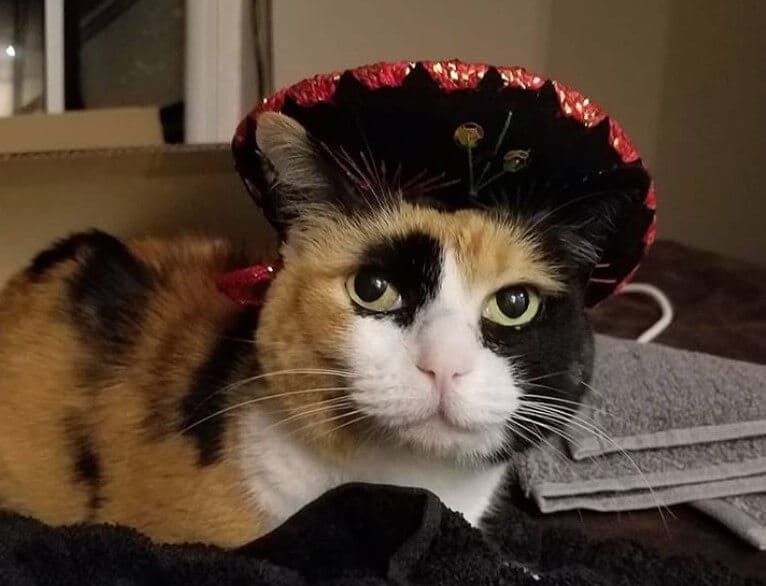
| Name | Meaning |
| Bella |
Italian/Spanish for “beautiful,” symbolizing elegance and charm
|
| Paola |
Derived from Latin, meaning “small” or “humble,” symbolizing modesty and humility
|
| Anita |
Diminutive of Anna, meaning “grace” or “favor,” symbolizing divine blessing
|
| Yolanda |
Derived from Old Germanic, meaning “violet,” symbolizing beauty and delicacy
|
| Lora |
Variant of Laura, derived from Latin, meaning “laurel” or “victory,” symbolizing triumph and honor
|
| Flor |
Spanish for “flower,” symbolizing beauty and vibrancy
|
| Dia |
Spanish for “day,” symbolizing light and warmth
|
| Esabella |
Combination of “Es” (devoted) and “Bella” (beautiful), symbolizing devotion and grace
|
| Esmeralda |
Spanish for “emerald,” symbolizing rarity and preciousness
|
| Josefina |
Feminine form of Joseph, meaning “God will increase,” symbolizing divine abundance
|
| Elsa |
Variant of Elizabeth, meaning “God is my oath,” symbolizing faith and commitment
|
| Santana |
Spanish for “saint,” symbolizing holiness and virtue
|
| Magdalena |
Derived from Hebrew, meaning “from Magdala,” symbolizing strength and resilience
|
| Brisa |
Spanish for “breeze,” symbolizing freshness and renewal
|
| Rosita |
Diminutive of Rosa, meaning “rose,” symbolizing love and beauty
|
| Savannah |
Derived from Spanish, meaning “treeless plain,” symbolizing openness and freedom
|
| Fuensanta |
Spanish for “holy fountain,” symbolizing purity and spirituality
|
| Lucinda |
Derived from Latin, meaning “light,” symbolizing illumination and clarity
|
| Rima |
Spanish for “rhyme,” symbolizing harmony and balance
|
| Cielo |
Spanish for “sky” or “heaven,” symbolizing vastness and transcendence
|
| Hija |
Spanish for “daughter,” symbolizing family and lineage
|
| Sancha |
Spanish diminutive of Sancho, meaning “saint,” symbolizing spirituality and holiness
|
| Angel |
English/Spanish for “angel,” symbolizing divine protection and guidance
|
| Felicia |
Derived from Latin, meaning “fortunate” or “happy,” symbolizing joy and positivity
|
| Lupe |
Short for Guadalupe, referring to the Virgin Mary, symbolizing grace and compassion
|
| Araceli |
Spanish for “altar of the sky,” symbolizing purity and transcendence
|
| Jacinda |
Variant of Jacinta, meaning “hyacinth flower,” symbolizing rebirth and renewal
|
| Teresa |
Derived from Greek, meaning “harvester” or “reaper,” symbolizing diligence and productivity
|
| Isabela |
Variant of Isabella, meaning “God is my oath,” symbolizing faith and commitment
|
| Valencia |
Spanish for “bravery” or “valor,” symbolizing courage and strength
|
| Santina |
Diminutive of Santana, meaning “little saint,” symbolizing innocence and purity
|
| Gata |
Spanish for “female cat,” symbolizing grace and agility
|
| Delores |
Derived from Spanish, meaning “sorrows” or “pains,” symbolizing endurance and resilience
|
| Leonora |
Feminine form of Leonardo, meaning “bright lioness,” symbolizing strength and courage
|
| Amor |
Spanish for “love,” symbolizing affection and compassion
|
| Rosa |
Spanish for “rose,” symbolizing beauty and love
|
| Ventura |
Spanish for “fortune” or “luck,” symbolizing prosperity and success
|
| Macaria |
Derived from Greek, meaning “blessed” or “happy,” symbolizing joy and contentment
|
| Blanca |
Spanish for “white,” symbolizing purity and innocence
|
| Adriana |
Feminine form of Adrian, meaning “from Hadria,” symbolizing strength and resilience
|
| Buena |
Spanish for “good,” symbolizing kindness and generosity
|
| Tia |
Spanish for “aunt,” symbolizing familial love and nurturing
|
| Niebla |
Spanish for “fog,” symbolizing mystery and ambiguity
|
| Latoya |
Variant of Latoya, meaning “victorious one,” symbolizing triumph and success
|
| Antonella |
Diminutive of Antonia, meaning “priceless” or “invaluable,” symbolizing value and importance
|
| Belinda |
Derived from Italian/Spanish, meaning “beautiful serpent” or “bright serpent,” symbolizing transformation and renewal
|
| Frederica |
Feminine form of Frederick, meaning “peaceful ruler,” symbolizing harmony and leadership
|
| Hada |
Spanish for “fairy” or “sprite,” symbolizing magic and enchantment
|
| Lela |
Variant of Leila, meaning “night” or “dark beauty,” symbolizing mystery and allure
|
| Nieve |
Spanish for “snow,” symbolizing purity and innocence
|
| Salsa |
Spanish for “sauce” or “dancing,” symbolizing flavor and rhythm
|
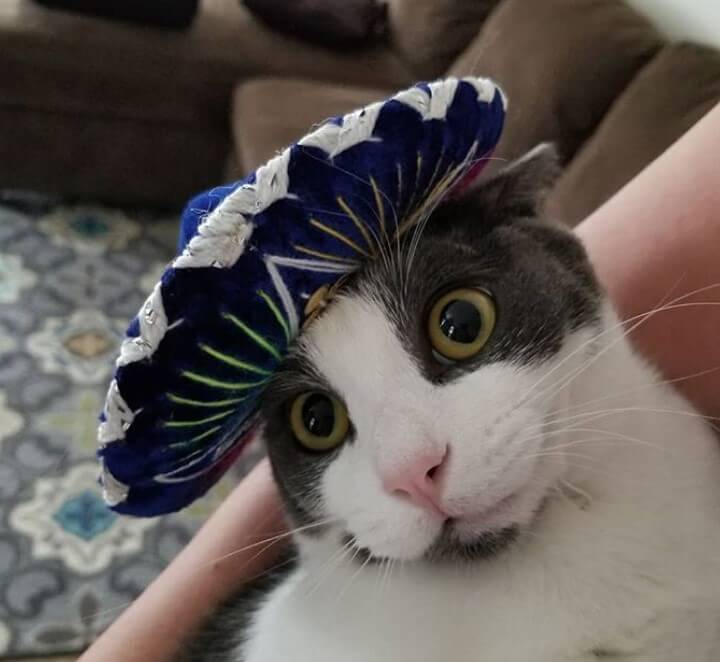
| Bricia |
Variant of Brigid, meaning “exalted one” or “strength,” symbolizing power and resilience
|
| Sonora |
Named after the Mexican state of Sonora, symbolizing warmth and vitality
|
| Leya |
Derived from loyalty, symbolizing faithfulness and devotion
|
| Luz |
Spanish for “light,” symbolizing illumination and clarity
|
| Rafaela |
Feminine form of Rafael, meaning “God has healed,” symbolizing restoration and healing
|
| Gloria |
Latin for “glory” or “fame,” symbolizing honor and prestige
|
| Inez |
Variant of Agnes, meaning “pure” or “chaste,” symbolizing innocence and virtue
|
| Eriella |
Combination of “Eri” (lion) and “ella” (female), symbolizing strength and courage
|
| Elena |
Variant of Helen, meaning “bright” or “shining one,” symbolizing radiance and beauty
|
| Loretta |
Variant of Laura, meaning “laurel” or “victory,” symbolizing triumph and success
|
| Gabriela |
Feminine form of Gabriel, meaning “God is my strength,” symbolizing divine empowerment
|
| Lindo |
Spanish for “lovely” or “beautiful,” symbolizing charm and grace
|
| Lavada |
Derived from Latin, meaning “pure” or “clean,” symbolizing innocence and clarity
|
| Francisca |
Feminine form of Francis, meaning “free man” or “Frenchman,” symbolizing independence
|
| Nina |
Spanish for “little girl,” symbolizing youthfulness and innocence
|
| Zerlina |
Variant of Serlina, meaning “sullen” or “serious,” symbolizing depth and introspection
|
| Cornelia |
Derived from Latin, meaning “horn,” symbolizing strength and resilience
|
| Playa |
Spanish for “beach,” symbolizing relaxation and serenity
|
| Jade |
A precious green gemstone, symbolizing beauty and rarity
|
| Manuela |
Feminine form of Manuel, meaning “God is with us,” symbolizing divine presence
|
| Julia |
Feminine form of Julius, meaning “youthful” or “downy,” symbolizing freshness and vitality
|
| Constanza |
Derived from Latin, meaning “steadfast” or “constant,” symbolizing perseverance
|
| Zanita |
Diminutive of Susana, meaning “lily,” symbolizing purity and innocence
|
| Osa |
Spanish for “female bear,” symbolizing strength and ferocity
|
| Candela |
Spanish for “candle,” symbolizing illumination and guidance
|
| Graciela |
Derived from Latin, meaning “grace,” symbolizing elegance and charm
|
| Carlotta |
Variant of Charlotte, meaning “free man” or “strong,” symbolizing independence and strength
|
| Amata |
Latin for “loved” or “beloved,” symbolizing affection and devotion
|
| Lita |
Diminutive of Carmelita, meaning “garden” or “vineyard,” symbolizing fertility and abundance
|
| Nita |
Spanish for “little girl,” symbolizing youthfulness and innocence
|
| Baya |
Spanish for “berry,” symbolizing sweetness and abundance
|
| Marcela |
Feminine form of Marcelo, meaning “young warrior,” symbolizing strength and courage
|
| Luna |
Spanish for “moon,” symbolizing mystery and femininity
|
| Mona |
Diminutive of Monica, meaning “advisor” or “counselor,” symbolizing wisdom and guidance
|
| Consuela |
Spanish for “consolation” or “comfort,” symbolizing solace and support
|
| Maria |
Latin for “sea of bitterness” or “rebelliousness,” symbolizing strength and resilience
|
| Carmen |
Spanish for “garden” or “vineyard,” symbolizing fertility and abundance
|
| Melosa |
Spanish for “sweet” or “gentle,” symbolizing kindness and tenderness
|
| Selena |
Variant of Selene, Greek goddess of the moon, symbolizing femininity and mystery
|
| Isabella |
Variant of Isabel, meaning “God is my oath,” symbolizing faith and commitment
|
| Chiquita |
Spanish for “little girl” or “small one,” symbolizing youthfulness and innocence
|
| Senalda |
Variant of Senalda, meaning “warrior,” symbolizing strength and courage
|
| Lareina |
Spanish for “the queen,” symbolizing royalty and majesty
|
| Marta |
Variant of Martha, meaning “lady” or “mistress,” symbolizing sophistication and grace
|
| Catalina |
Derived from Greek, meaning “pure” or “unsullied,” symbolizing innocence and clarity
|
| Martina |
Feminine form of Martin, meaning “warlike” or “dedicated to Mars,” symbolizing strength and courage
|
| Aconcia |
Spanish for “comets” or “shooting stars,” symbolizing brightness and energy
|
| Querida |
Spanish for “dear” or “beloved,” symbolizing affection and devotion
|
| Dulcea |
Spanish for “sweet” or “delightful,” symbolizing kindness and tenderness
|
| Daniella |
Feminine form of Daniel, meaning “God is my judge,” symbolizing faith and justice
|
| Fabiana |
Feminine form of Fabian, meaning “bean grower,” symbolizing fertility and growth
|
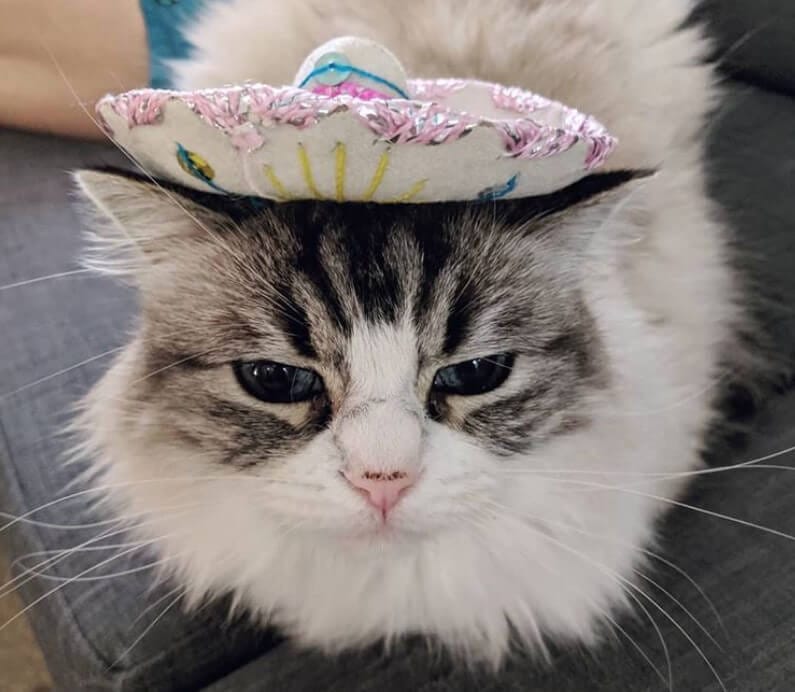
| Felipa |
A woman who is friendly with horses, symbolizing affinity with animals
|
| Mariposa |
Spanish for “butterfly,” symbolizing grace, transformation, and beauty
|
| Felicidad |
Spanish for “luck” or “happiness,” symbolizing joy and fortune
|
| Maite |
Variant of Maia, meaning “lady of the house,” symbolizing authority and leadership
|
| Grecia |
Spanish for “graceful,” symbolizing elegance and poise
|
| Sierra |
Spanish for “mountains,” symbolizing strength, stability, and resilience
|
| Marina |
Derived from Latin, meaning “of the sea,” symbolizing fluidity and adaptability
|
| Perdita |
Latin for “lost” or “stray,” symbolizing wanderlust and curiosity
|
| Soledad |
Spanish for “solitude” or “loneliness,” symbolizing introspection and independence
|
| Madra |
Derived from madre, Spanish for “mother,” symbolizing nurturing and maternal instincts
|
| Bebe |
Spanish for “baby,” symbolizing innocence and playfulness
|
| Reina |
Spanish for “queen,” symbolizing royalty, elegance, and grace
|
| Carissa |
Derived from Greek, meaning “grace” or “kindness,” symbolizing compassion and empathy
|
| Corazón |
Spanish for “heart,” symbolizing love, affection, and passion
|
| Alejandra |
Feminine form of Alejandro, meaning “defender of mankind,” symbolizing strength and protection
|
| Sancia |
Variant of Sancho, meaning “holy,” symbolizing purity and righteousness
|
| Fernanda |
Feminine form of Ferdinand, meaning “bold voyager,” symbolizing adventure and exploration
|
| Perla |
Spanish for “pearl,” symbolizing beauty, rarity, and purity
|
| Neva |
Derived from nevar, Spanish for “snow,” symbolizing purity and innocence
|
| Luza |
Variant of Luz, meaning “light,” symbolizing illumination, enlightenment, and guidance
|
| Giselle |
Derived from Germanic roots, meaning “pledge” or “hostage,” symbolizing loyalty and commitment
|
| Lluvia |
Spanish for “rain,” symbolizing renewal, growth, and abundance
|
| Risa |
Spanish for “laughter,” symbolizing joy, happiness, and positivity
|
| Paloma |
Spanish for “dove,” symbolizing peace, purity, and gentleness
|
| Juana |
Feminine form of Juan, meaning “God is gracious,” symbolizing divine grace and mercy
|
| Marcia |
Derived from Latin, meaning “warlike” or “dedicated to Mars,” symbolizing strength and courage
|
| Charo |
Diminutive of Rosario, meaning “rosary” or “crown of roses,” symbolizing devotion and faith
|
| Justina |
Feminine form of Justin, meaning “just” or “fair,” symbolizing integrity and righteousness
|
| Alta |
Spanish for “high” or “tall,” symbolizing stature, dignity, and pride
|
| Morena |
Spanish for “brunette” or “dark-skinned,” symbolizing beauty and allure
|
| Juanita |
Diminutive of Juana, symbolizing youthfulness and innocence
|
| Safira |
Spanish for “sapphire,” symbolizing wisdom, truth, and sincerity
|
| Sofia |
Derived from Greek, meaning “wisdom,” symbolizing intelligence, insight, and enlightenment
|
| Felisa |
Derived from felix, Latin for “lucky” or “successful,” symbolizing good fortune and prosperity
|
| Rita |
Diminutive of Margarita, meaning “pearl,” symbolizing beauty, rarity, and purity
|
| Coraima |
Variant of Cora, meaning “maiden” or “maiden-like,” symbolizing youthfulness and purity
|
| Renata |
Feminine form of Renatus, meaning “reborn” or “renewed,” symbolizing regeneration and growth
|
| Belita |
Spanish for “beautiful,” symbolizing grace, charm, and elegance
|
| Eva |
Derived from Hebrew, meaning “life” or “living,” symbolizing vitality and resilience
|
| Florita |
Diminutive of Flora, meaning “flower” or “blossom,” symbolizing beauty, growth, and fertility
|
| Melia |
Variant of Amelia, meaning “industrious” or “striving,” symbolizing determination and perseverance
|
| Rosario |
Spanish for “rosary” or “crown of roses,” symbolizing devotion and faith
|
| Bonita |
Spanish for “pretty woman,” symbolizing beauty, charm, and grace
|
| Leticia |
Derived from Latin, meaning “happiness” or “joy,” symbolizing contentment and bliss
|
| Ria |
Derived from Spanish, meaning “river” or “stream,” symbolizing fluidity and adaptability
|
| Juliana |
Feminine form of Julian, meaning “youthful” or “downy,” symbolizing freshness and vitality
|
| Carmelita |
Diminutive of Carmen, meaning “garden” or “vineyard,” symbolizing fertility and abundance
|
| Carina |
Derived from Latin, meaning “beloved” or “dear one,” symbolizing affection and devotion
|
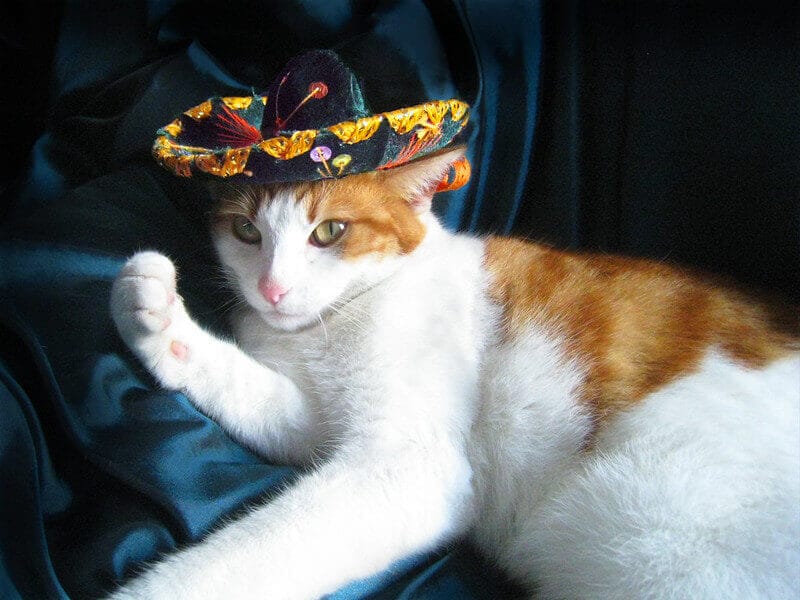
| Ximena |
Derived from Hebrew, meaning “hearkening” or “listener,” symbolizing attentiveness and awareness
|
| Mora |
Spanish for “blackberry,” symbolizing sweetness and abundance
|
| Rosalinda |
Combination of Rosa and Linda, meaning “beautiful rose,” symbolizing beauty and grace
|
| Inocencia |
Spanish for “innocence,” symbolizing purity, sincerity, and naivety
|
| Zoila |
Derived from Greek, meaning “life,” symbolizing vitality and energy
|
| Presencia |
Spanish for “presence,” symbolizing strength, charisma, and influence
|
| Luisa |
Feminine form of Luis, meaning “famous warrior,” symbolizing courage and resilience
|
| Silvia |
Derived from Latin, meaning “forest” or “woods,” symbolizing nature and tranquility
|
| Delora |
Variant of Delores, meaning “sorrow” or “pain,” symbolizing empathy and compassion
|
| Alegría |
Spanish for “joy,” symbolizing happiness, optimism, and positivity
|
| Zita |
Diminutive of Teresa, meaning “harvester” or “reaper,” symbolizing productivity and abundance
|
| Dahlia |
Named after the flower Dahlia, symbolizing elegance, dignity, and inner strength
|
| Biele |
Spanish for “dance,” symbolizing movement, rhythm, and expression
|
| Nelia |
Variant of Cornelia, meaning “horn” or “war horn,” symbolizing alertness and vigilance
|
| Letitia |
Derived from Latin, meaning “joy” or “happiness,” symbolizing contentment and bliss
|
| Emelda |
Variant of Imelda, meaning “universal battle,” symbolizing strength and resilience
|
| Alma |
Spanish for “soul” or “spirit,” symbolizing inner essence, vitality, and life force
|
| Gitana |
Spanish for “gypsy” or “wanderer,” symbolizing freedom, independence, and adventure
|
| Lola |
Diminutive of Dolores, meaning “sorrows” or “pains,” symbolizing empathy and compassion
|
| Drina |
Derived from Adrina, meaning “from Hadria,” symbolizing adaptability and versatility
|
| Lucita |
Diminutive of Lucia, meaning “light,” symbolizing illumination and enlightenment
|
| Zelia |
Variant of Celia, meaning “heavenly” or “divine,” symbolizing purity and grace
|
| Beatriz |
Derived from Latin, meaning “bringer of joy,” symbolizing happiness and positivity
|
| Vida |
Spanish for “life,” symbolizing vitality, energy, and liveliness
|
| Verónica |
Derived from Greek, meaning “she who brings victory,” symbolizing triumph and success
|
| Selva |
Spanish for “jungle” or “forest,” symbolizing wildness, mystery, and exploration
|
| Xiomara |
Derived from Basque, meaning “famous in battle,” symbolizing courage and valor
|
| Tierra |
Spanish for “earth” or “land,” symbolizing grounding, stability, and connection
|
| Roberta |
Feminine form of Robert, meaning “bright fame,” symbolizing distinction and renown
|
| Montaña |
Spanish for “mountain,” symbolizing strength, endurance, and perseverance
|
| Olinda |
Derived from Latin, meaning “beautiful” or “charming,” symbolizing grace and elegance
|
| Guadalupe |
Spanish for “river of the wolf,” symbolizing fluidity, adaptability, and strength
|
| Alicia |
Derived from Alice, meaning “noble” or “of noble birth,” symbolizing dignity and grace
|
| Cascada |
Spanish for “waterfall,” symbolizing movement, flow, and change
|
| Mercedes |
Derived from Latin, meaning “mercies” or “gifts,” symbolizing generosity and kindness
|
| Fantasia |
Spanish for “fantasy,” symbolizing imagination, creativity, and whimsy
|
| Alessandra |
Italian form of Alexandra, meaning “defender of mankind,” symbolizing protection and strength
|
| Frida |
Derived from Germanic roots, meaning “peace” or “beloved,” symbolizing tranquility and affection
|
| Lucia |
Derived from Latin, meaning “light,” symbolizing illumination, enlightenment, and warmth
|
| Chica |
Spanish for “girl” or “little one,” symbolizing youthfulness and innocence
|
| Madrona |
Spanish for “lady,” symbolizing grace, elegance, and sophistication
|
| Cristina |
Derived from Greek, meaning “anointed” or “follower of Christ,” symbolizing faith and devotion
|
| Lalo |
Diminutive of Eduardo, symbolizing affection, familiarity, and closeness
|
| Faustina |
Feminine form of Faustus, meaning “lucky” or “fortunate,” symbolizing good fortune
|
| Patia |
Variant of Patricia, meaning “noble” or “patrician,” symbolizing dignity and refinement
|
| Damita |
Spanish for “damsel” or “little lady,” symbolizing femininity and grace
|
| Rocio |
Spanish for “dew” or “morning dew,” symbolizing freshness, purity, and renewal
|
| Esperanza |
Spanish for “hope,” symbolizing optimism, faith, and resilience
|
| Natalia |
Derived from Latin, meaning “Christmas Day” or “birth,” symbolizing rebirth and new beginnings
|
| Baja |
Spanish for “short woman,” symbolizing petite size and charm
|
| Estrella |
Spanish for “star,” symbolizing guidance, illumination, and inspiration
|
| Idola |
Spanish for “idol” or “icon,” symbolizing admiration, reverence, and influence
|
| Margarita |
Spanish for “daisy flower,” symbolizing purity, innocence, and simplicity
|
| Eldora |
Derived from Greek, meaning “golden” or “gilded,” symbolizing richness and warmth
|
| Tasia |
Variant of Anastasia, meaning “resurrection” or “rebirth,” symbolizing renewal and transformation
|
| Hermosa |
Spanish for “beautiful,” symbolizing elegance, charm, and grace
|
Mexican Cat Names Inspired by Food & Beverages
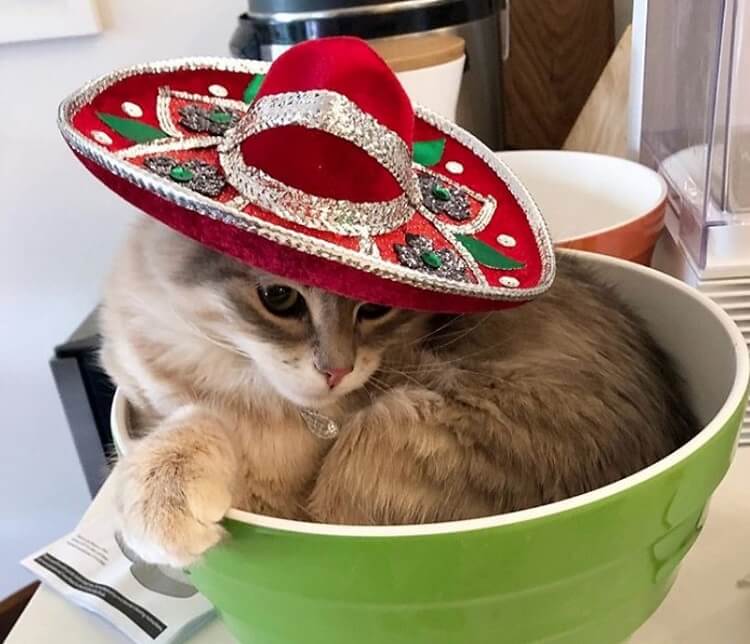
- Taco
- Nacho
- Tequila
- Gordita
- Corona
- Tamale
- Panucho
- Salsa
- Fresca
- Paloma
- Negra Modelo
- Burrito
- Enchilada
- Margarita
- Chilaquiles
- Yuca
- Dos Equis
- Jicama
- Empanada
- Guacamole
- Sangrita
- Chalupa
Mexican Cat Names Inspired by Geographical Places

- Merida
- Acapulco
- Morelia
- Saltillo
- Mexicali
- Cozumel
- Juarez
- Quintana Roo
- Veracruz
- Juarez
- Ensenada
- Leon
- Matamoros
- Ixtapa
- Durango
- Guadalupe
- Toluca
- Tijuana
- Cancun
- Hidalgo
- Jalisco
- Celaya
- Reynosa
- La Paz
- Tampico
- Durango
- Torreon
- Puebla
- Sonora
- Chiapas
- Zamora
- Colima
- Tabasco
- Mazatlan
- Monterrey
Popular Mexican Words as Cat Names

- Toro – Bull
- Alba – Daybreak
- Cordero – Lamb
- Diablo – Devil
- Amigo – Friend (male)
- Alma – Soul
- Hola – Hello
- Santo – Saint
- Amiga – Friend (female)
- Blanco – White
- Tigre – Tiger
- Sierra – Mountains
- Fiesta – Party
- Domingo – Sunday
- Solana – Sunny Spot
- Chico – Boy
- Sol – Sun
- Che – Buddy or Dude
- Gatito – Kitten
- Chica – Girl
- Querida – Dear
- Gato – Cat
- Bonita – Pretty
You can also find out the other best Mexican cat names
Tips on How to Choose a Mexican Cat Name
When choosing a Mexican cat name, consider the following tips:
Consider the cat’s personality
Mexican culture is rich and diverse, with many unique characteristics that can inspire a cat name.
Consider your cat’s personality traits, such as playful, curious, or adventurous, and choose a name that reflects those qualities.
Research Mexican culture
Mexican culture is steeped in history and tradition. Researching Mexican culture can inspire unique and meaningful cat names.
Look into Mexican folklore, mythology, or historical figures for inspiration.
Use Spanish words
Spanish is the official language of Mexico, and incorporating Spanish words into your cat’s name can add a unique touch.
Use words like “gato” (cat), “miau” (meow), or “feliz” (happy) to create a name that reflects your cat’s Mexican heritage.
Consider popular Mexican traditions
Mexican traditions like Day of the Dead (Día de los Muertos) or the Fiesta de San Marcos can provide inspiration for unique cat names.
Consider naming your cat after a popular Mexican saint or a traditional Mexican dish.
Use a combination of words
Creating a unique name by combining two or more Spanish words can result in a fun and memorable name for your cat.
For example, “Gato Miau” or “Feliz Gato” can be a playful and catchy name for your feline friend.
Conclusion
Finding the ideal name for your new feline friend can be a fun and exciting adventure.
Whether you seek a name that reflects your cat’s personality, its appearance, or its favorite food, there’s something for every kitty here!
Remember, the best name is one that you love and that rolls off the tongue easily.
Spend some time observing your cat’s unique quirks and consider how they might inspire the perfect moniker.
There are many cultures, languages, and traditions all over the world that can inspire you to find the best cat names.
If you need more ideas, you can visit our foreign cat names page.
- Does Cat Litter Melt Ice? The Complete Guide to Winter Safety - January 30, 2026
- Happy Tail Dogs: Understanding This Common Canine Condition - January 29, 2026
- How Cold Can Outdoor Cats Handle? Feline Winter Safety - January 27, 2026


GIPHY App Key not set. Please check settings